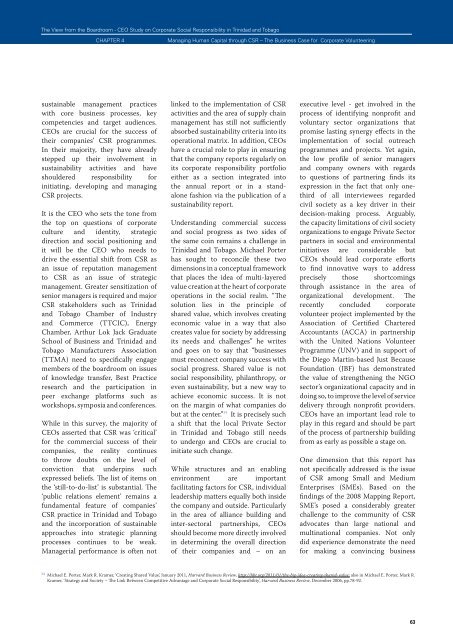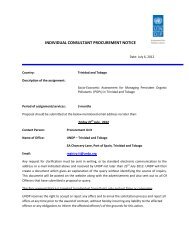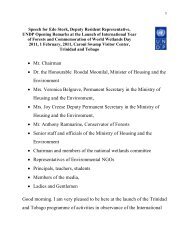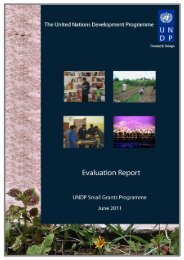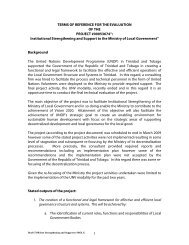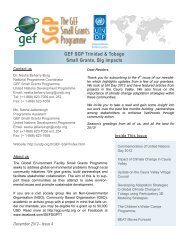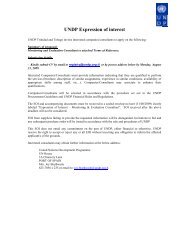The View from the Boardroom - UNDP Trinidad and Tobago
The View from the Boardroom - UNDP Trinidad and Tobago
The View from the Boardroom - UNDP Trinidad and Tobago
Create successful ePaper yourself
Turn your PDF publications into a flip-book with our unique Google optimized e-Paper software.
<strong>The</strong> <strong>View</strong> <strong>from</strong> <strong>the</strong> <strong>Boardroom</strong> - CEO Study on Corporate Social Responsibility in <strong>Trinidad</strong> <strong>and</strong> <strong>Tobago</strong>CHAPTER 4Managing Human Capital through CSR – <strong>The</strong> Business Case for Corporate Volunteeringsustainable management practiceswith core business processes, keycompetencies <strong>and</strong> target audiences.CEOs are crucial for <strong>the</strong> success of<strong>the</strong>ir companies’ CSR programmes.In <strong>the</strong>ir majority, <strong>the</strong>y have alreadystepped up <strong>the</strong>ir involvement insustainability activities <strong>and</strong> haveshouldered responsibility forinitiating, developing <strong>and</strong> managingCSR projects.It is <strong>the</strong> CEO who sets <strong>the</strong> tone <strong>from</strong><strong>the</strong> top on questions of corporateculture <strong>and</strong> identity, strategicdirection <strong>and</strong> social positioning <strong>and</strong>it will be <strong>the</strong> CEO who needs todrive <strong>the</strong> essential shift <strong>from</strong> CSR asan issue of reputation managementto CSR as an issue of strategicmanagement. Greater sensitization ofsenior managers is required <strong>and</strong> majorCSR stakeholders such as <strong>Trinidad</strong><strong>and</strong> <strong>Tobago</strong> Chamber of Industry<strong>and</strong> Commerce (TTCIC), EnergyChamber, Arthur Lok Jack GraduateSchool of Business <strong>and</strong> <strong>Trinidad</strong> <strong>and</strong><strong>Tobago</strong> Manufacturers Association(TTMA) need to specifically engagemembers of <strong>the</strong> boardroom on issuesof knowledge transfer, Best Practiceresearch <strong>and</strong> <strong>the</strong> participation inpeer exchange platforms such asworkshops, symposia <strong>and</strong> conferences.While in this survey, <strong>the</strong> majority ofCEOs asserted that CSR was ‘critical’for <strong>the</strong> commercial success of <strong>the</strong>ircompanies, <strong>the</strong> reality continuesto throw doubts on <strong>the</strong> level ofconviction that underpins suchexpressed beliefs. <strong>The</strong> list of items on<strong>the</strong> ‘still-to-do-list’ is substantial. <strong>The</strong>‘public relations element’ remains afundamental feature of companies’CSR practice in <strong>Trinidad</strong> <strong>and</strong> <strong>Tobago</strong><strong>and</strong> <strong>the</strong> incorporation of sustainableapproaches into strategic planningprocesses continues to be weak.Managerial performance is often notlinked to <strong>the</strong> implementation of CSRactivities <strong>and</strong> <strong>the</strong> area of supply chainmanagement has still not sufficientlyabsorbed sustainability criteria into itsoperational matrix. In addition, CEOshave a crucial role to play in ensuringthat <strong>the</strong> company reports regularly onits corporate responsibility portfolioei<strong>the</strong>r as a section integrated into<strong>the</strong> annual report or in a st<strong>and</strong>alonefashion via <strong>the</strong> publication of asustainability report.Underst<strong>and</strong>ing commercial success<strong>and</strong> social progress as two sides of<strong>the</strong> same coin remains a challenge in<strong>Trinidad</strong> <strong>and</strong> <strong>Tobago</strong>. Michael Porterhas sought to reconcile <strong>the</strong>se twodimensions in a conceptual frameworkthat places <strong>the</strong> idea of multi-layeredvalue creation at <strong>the</strong> heart of corporateoperations in <strong>the</strong> social realm. “<strong>The</strong>solution lies in <strong>the</strong> principle ofshared value, which involves creatingeconomic value in a way that alsocreates value for society by addressingits needs <strong>and</strong> challenges” he writes<strong>and</strong> goes on to say that “businessesmust reconnect company success withsocial progress. Shared value is notsocial responsibility, philanthropy, oreven sustainability, but a new way toachieve economic success. It is noton <strong>the</strong> margin of what companies dobut at <strong>the</strong> center.” 34 It is precisely sucha shift that <strong>the</strong> local Private Sectorin <strong>Trinidad</strong> <strong>and</strong> <strong>Tobago</strong> still needsto undergo <strong>and</strong> CEOs are crucial toinitiate such change.While structures <strong>and</strong> an enablingenvironment are importantfacilitating factors for CSR, individualleadership matters equally both inside<strong>the</strong> company <strong>and</strong> outside. Particularlyin <strong>the</strong> area of alliance building <strong>and</strong>inter-sectoral partnerships, CEOsshould become more directly involvedin determining <strong>the</strong> overall directionof <strong>the</strong>ir companies <strong>and</strong> – on anexecutive level - get involved in <strong>the</strong>process of identifying nonprofit <strong>and</strong>voluntary sector organizations thatpromise lasting synergy effects in <strong>the</strong>implementation of social outreachprogrammes <strong>and</strong> projects. Yet again,<strong>the</strong> low profile of senior managers<strong>and</strong> company owners with regardsto questions of partnering finds itsexpression in <strong>the</strong> fact that only onethirdof all interviewees regardedcivil society as a key driver in <strong>the</strong>irdecision-making process. Arguably,<strong>the</strong> capacity limitations of civil societyorganizations to engage Private Sectorpartners in social <strong>and</strong> environmentalinitiatives are considerable butCEOs should lead corporate effortsto find innovative ways to addressprecisely those shortcomingsthrough assistance in <strong>the</strong> area oforganizational development. <strong>The</strong>recently concluded corporatevolunteer project implemented by <strong>the</strong>Association of Certified CharteredAccountants (ACCA) in partnershipwith <strong>the</strong> United Nations VolunteerProgramme (UNV) <strong>and</strong> in support of<strong>the</strong> Diego Martin-based Just BecauseFoundation (JBF) has demonstrated<strong>the</strong> value of streng<strong>the</strong>ning <strong>the</strong> NGOsector’s organizational capacity <strong>and</strong> indoing so, to improve <strong>the</strong> level of servicedelivery through nonprofit providers.CEOs have an important lead role toplay in this regard <strong>and</strong> should be partof <strong>the</strong> process of partnership building<strong>from</strong> as early as possible a stage on.One dimension that this report hasnot specifically addressed is <strong>the</strong> issueof CSR among Small <strong>and</strong> MediumEnterprises (SMEs). Based on <strong>the</strong>findings of <strong>the</strong> 2008 Mapping Report,SME’s posed a considerably greaterchallenge to <strong>the</strong> community of CSRadvocates than large national <strong>and</strong>multinational companies. Not onlydid experience demonstrate <strong>the</strong> needfor making a convincing business34 Michael E. Porter, Mark R. Kramer, ‘Creating Shared Value’, January 2011, Harvard Business Review, http://hbr.org/2011/01/<strong>the</strong>-big-idea-creating-shared-value; also in Michael E. Porter, Mark R.Kramer, ‘Strategy <strong>and</strong> Society – <strong>The</strong> Link Between Competitive Advantage <strong>and</strong> Corporate Social Responsibility’, Harvard Business Review, December 2006, pp.78-92.63


